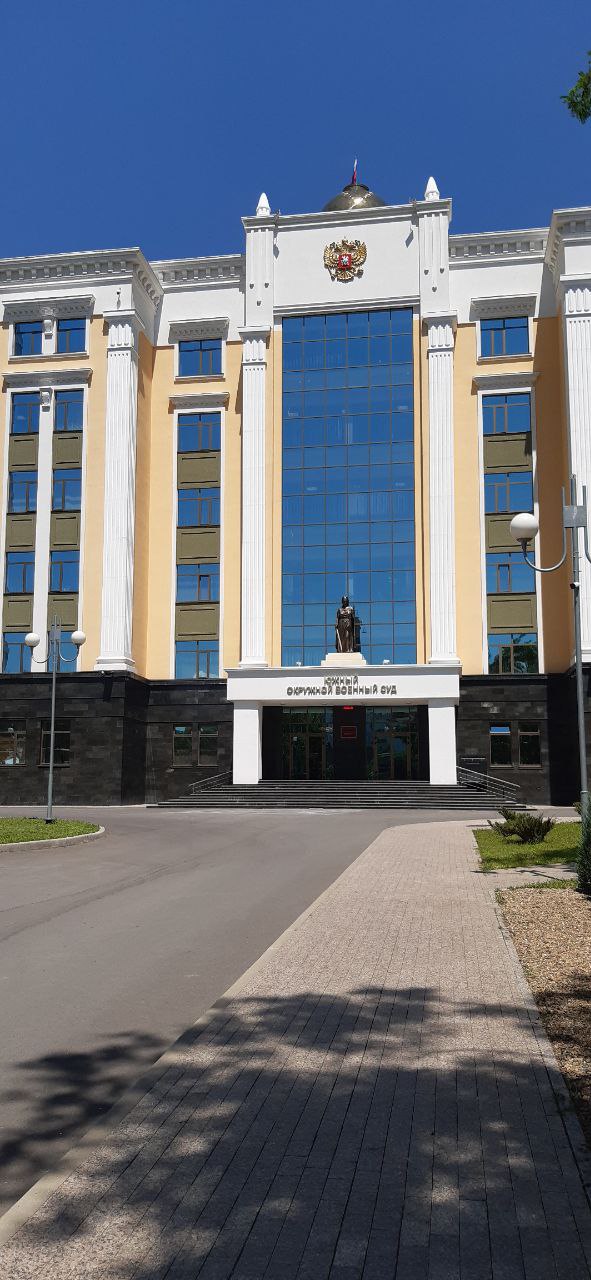

About the case: The case was initiated against 24 individuals from the “Azov” battalion (a terrorist organization forbidden in Russia [we are obligated by the Russian law to write this, ed. note]), nine of them being women, with two others exchanged before the start of the trial. The defendants are accused under Article 278 of the Criminal Code – violent seizure of power or violent retention of power, as well as Article 205.5 of the Criminal Code – organizing the activities of a terrorist organization and participating in the activities of such an organization. Several defendants are charged under Article 205.3 of the Criminal Code – training for terrorist activities.
The case is being considered by the three-judge panel, presided by Judge Vyacheslav Alexeevich Korsakov of the Southern Military District Court.
The hearing begins at 11:00 (instead of 10:00). Defense lawyers Belikova, Dubrovina, Stepanova, Krasnoshchekov are absent.
The witness Igor Olegovich Tekin is summoned. The judge asked for the witness’s profile and whether he knew any of the defendants. The witness answered that his sister was the defendant Marina Olegovna Tekin. The judge read the witness his rights, including the right not to testify against his relatives.
The prosecutor began questioning the witness:
– What does the sister have to do with the Azov Regiment (a terrorist organization banned in Russia)?
– She has served under contract since April 2021.
– What was her specialty?
– Cook.
– Was she pressured to enlist or did she want to?
– Her sister enlisted due to her difficult financial situation.
– Where did she serve? Give the full name of the military unit.
– In the city of Mariupol. I don’t know the name of the unit.
– Did your sister file a report on the change of military unit?
– I don’t know.
– Do you know the Azov regiment (terrorist organization, banned in Russia)? What did they do?
– I only know that such a regiment exists, I don’t know the details.
Defense:
– How would you characterize your sister?
– As a loving daughter, responsible.
– Did you ever see your sister in a military uniform?
– No.
– For how long was the contract signed?
– I don’t know.
The prosecutor files a motion in connection with the witness’s inconsistent testimony that he does not know the full name of the unit, dates of service, and whether he saw the defendant in military uniform.
The defense objects – the witness is not required to know the exact name and specific dates.
The judge decides to deny the motion as it has no specific legal significance.
The questioning is over. The witness is released.
The prosecutor reads the case materials, the records of the search of the personal belongings of the accused at the time of arrest.
The materials of the case were read out, in which 77 persons affected by the activities of the Azov Regiment (a terrorist organization banned in Russia) were mentioned. The defense asked to call the victims. The prosecutor stated that this was indirectly relevant to the case and did not apply to the defendants. The defense objected to the admission of this material into the case, as it was not relevant to the defendants in the trial. The judge made no response to the objections. The prosecutor agrees with the defense that it is not relevant to this trial.
The defense files a motion stating that there are things in the case file that are not actually there. The defense wants to check the relevance of the case file to the items seized as evidence and, if necessary, challenge their relevance to the case file. The motion is granted.
The prosecutor states that the witness Dotsenko wants to give his testimony against a receipt, to be present in person or by videoconference, the witness does not want to because of illness, there is no certificate of illness itself. The prosecutor asks to include it in the case file.
The judge states that the defendants may testify at the next hearing and specifies that they also have the right not to testify.
© 2019-2021 Independent public portal on impartial trial monitoring
